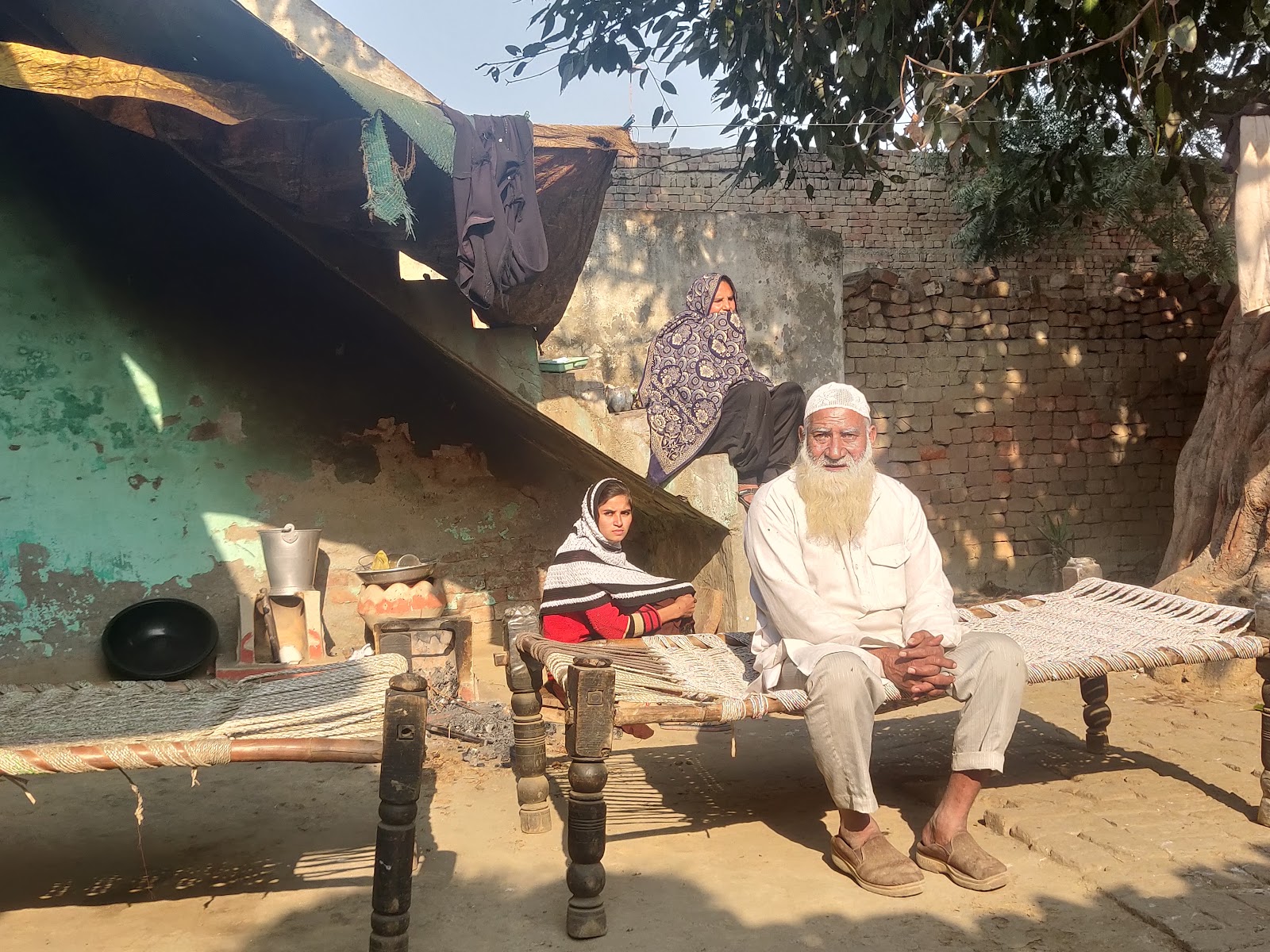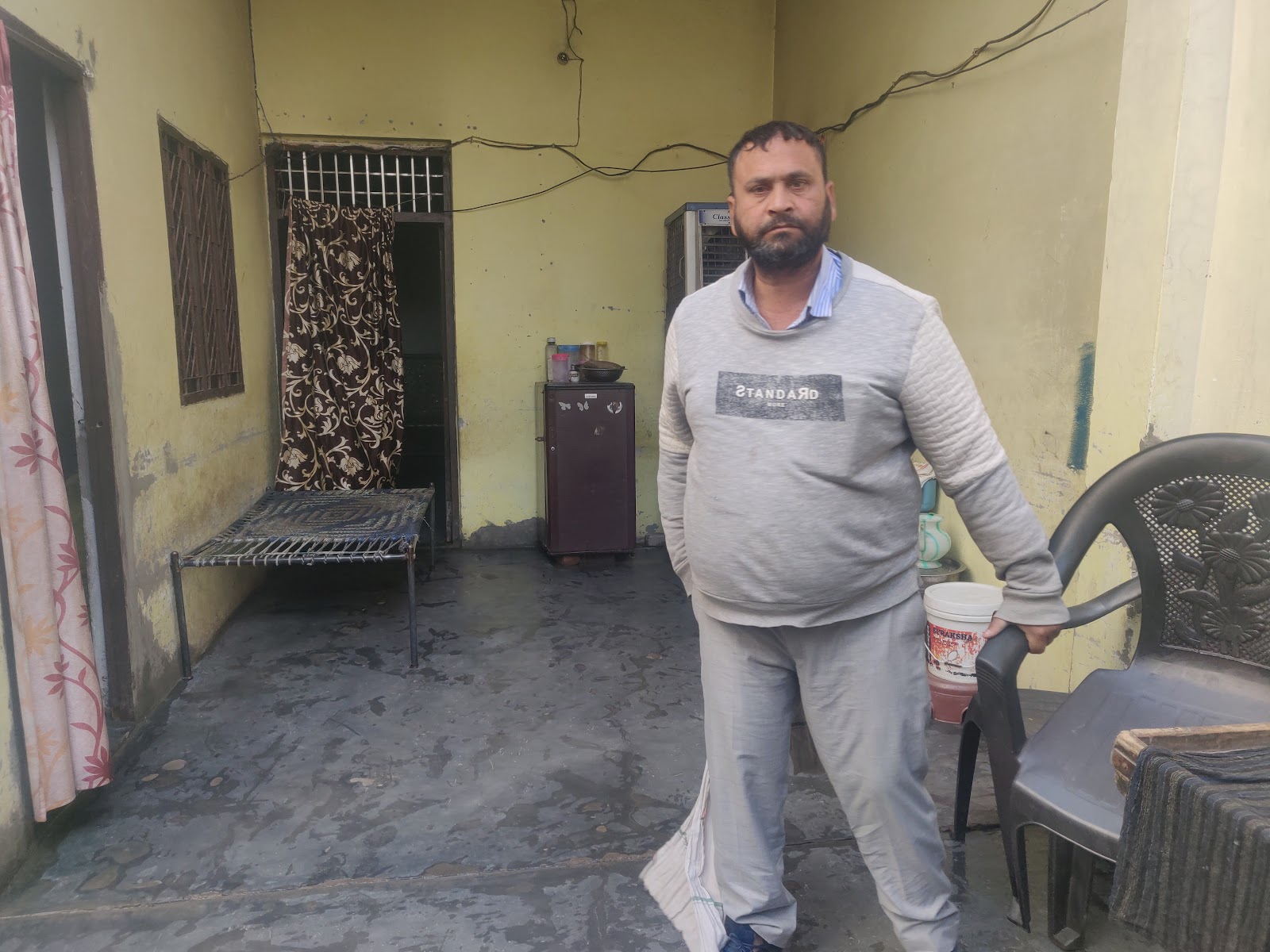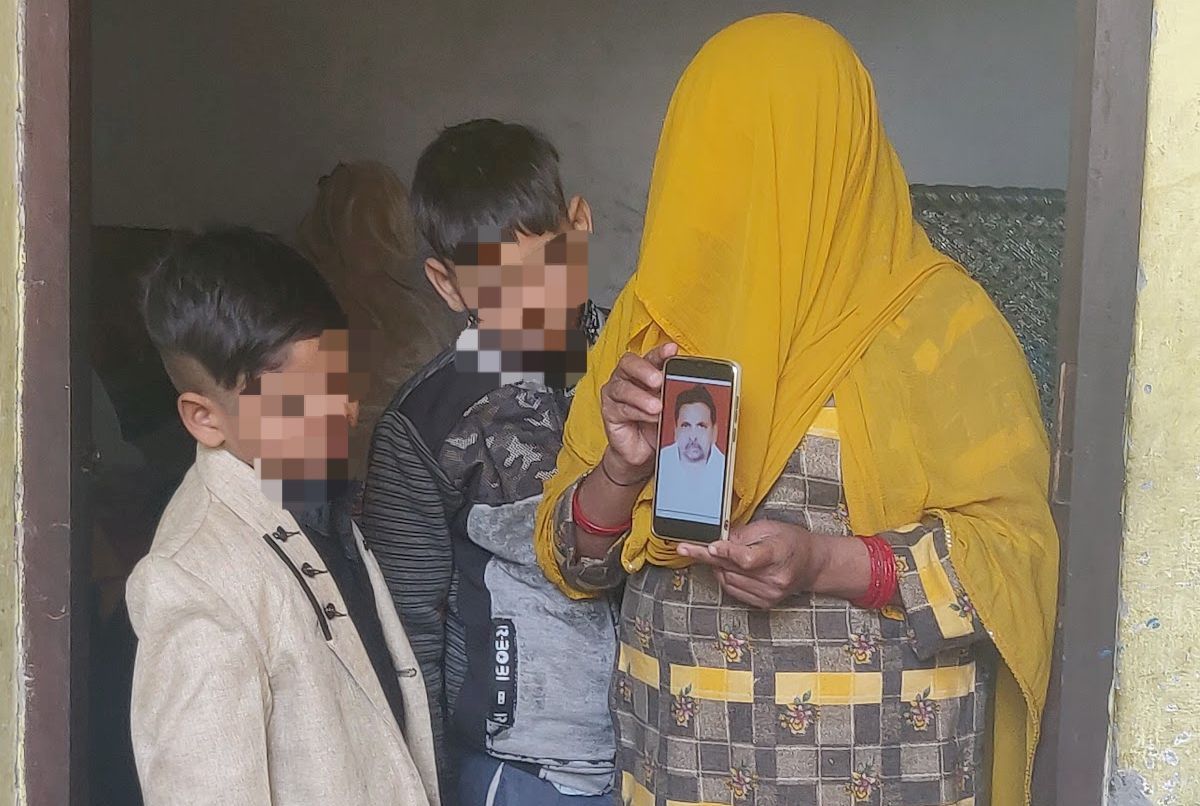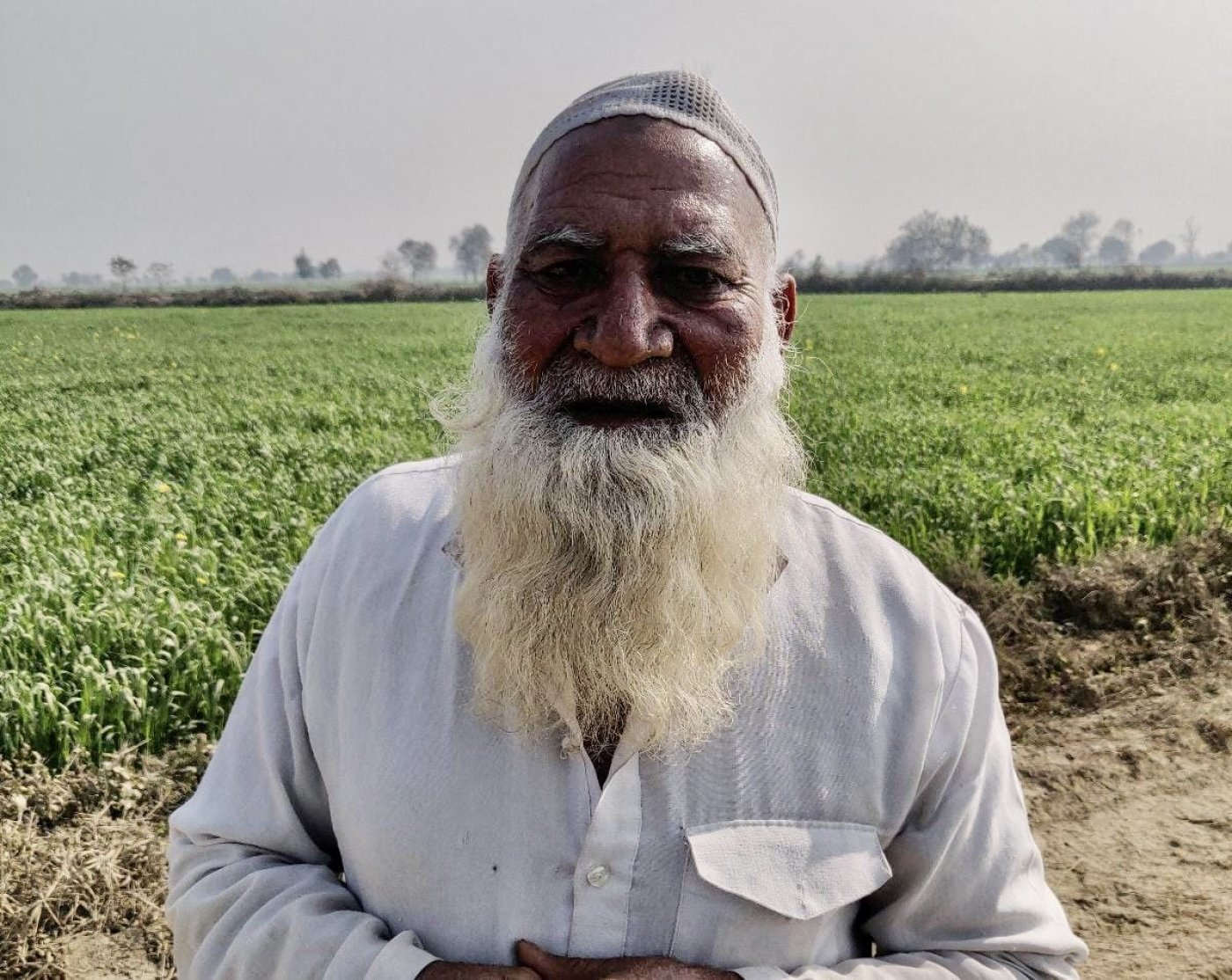Hapur/Delhi: A faint imprint of the words “Allah” and “786”—a number linked to Islam—was noticeable above the wooden front door of the white-plastered pucca house of a 62-year-old farmer, Samayadeen, in a corner of Madapur-Mustafabad village in western Uttar Pradesh (UP).
The compound inside had plenty of sunlight and was airy, big enough to spread two large cots and store piles of cow dung cakes. A buffalo was tied inside a shed facing the inner courtyard.
A police guard's round-the-clock presence was a constant reminder of the security threat Samaydeen faced. He was the survivor and injured eyewitness in a 2018 lynching in which a 45-year-old goat trader, Qasim, was murdered by a Hindu mob in daylight over fabricated rumours of cow slaughter.
Even in the calm setting, where farmers like him grew wheat, sugarcane and mustard, and children played with handpumps, Samaydeen's face reflected nervousness. His white kurta pyjama, white flowing beard and white netted skullcap distinguished him from the lush green field behind him—the same fields where he was nearly killed by a violent mob in 2018.
Yet, he hoped the Indian judiciary would provide him justice one day.
That day came on 12 March 2024—almost six years after the incident.
“Kudrat ka kamaal tha (It was destiny at work). Perhaps the universe saved me so I could fight the case and get justice for myself and Qasim,” Samaydeen told Article 14, speaking over the phone following the judgment.
Samaydeen’s testimony of the crime committed on 18 June 2018, and identification of the accused persons proved to be among the clinching evidence based on which a court in Hapur convicted 10 dominant caste Hindu men—many of them young—for the brutal murder and sentenced them to life imprisonment.
In the ten years since the Bharatiya Janata Party (BJP) came to power and Hindu extremists started killing Muslims in the name of cow protection, this was one of the rare cases where the guilty men were given a life sentence, which is not defined under the Indian Penal Code, 1860, but the Supreme Court in 2021 said it was prison time for life.
In 2018, a court in Jharkhand sentenced 11 men for lynching a Muslim trader on the suspicion that he was carrying beef.
The legal battle was a complex one.
Samaydeen survived a murderous mob in 2018. But it was only the beginning of a long and arduous journey, laden with threats, pressure, lures and complications of the justice delivery system—from a diluted FIR to an unreasonable delay and apathy in recording statements of key witnesses and other negligence by the police.
From the start, Samaydeen and Qasim’s kin questioned the police investigation and accused them of a cover-up.
The first task was to set the record straight about the incident—it was a crime with a clear communal angle and not a motorcycle accident that flared up into a violent dispute.
Samaydeen also resisted attempts—allegedly both by local police and kin of the accused—to reach a compromise with those who tried to kill him.
On three occasions over the years, the judgement was reserved, but it could not be delivered as the judge had been changed right before it could be pronounced.
In her 157-page judgement, additional district and sessions judge Shweta Dixit said Qasim’s lynching was a “heinous” crime. She observed that the act of the mob in Hapur was a “warning” and a “threat” to society at large. The men—Yudhisthir, Rakesh, Kanu, Sonu, Mangeram, Rinku, Hariom, Manish, Lalit and Karanpal—were convicted for murder, attempt to murder, rioting with deadly weapon and promoting enmity between groups on the basis of religion and fined Rs 58,000 each.
“The accused formed a mob and murdered an innocent person and grievously injured another person. The crime committed by the accused in the said matter is heinous in nature and a warning to the entire society,” the judge said.
Samaydeen’s testimony, which formed the crux of the prosecution case, was held credible and reliable under the law by the Hapur judge because he was an injured witness. His identification of the accused men by name or face decided the fate of the case.
In his testimony, Samaydeen described the assault in graphic detail—how the first lathi landed on his shoulder and how, despite the second one landing on his head, he did not lose consciousness. He also recounted the fake allegations of cow slaughter levelled against him and Qasim by the mob. There was no cow or carcass in sight, he stressed.
Samaydeen’s allegations were validated when Dixit also found the state police complicit in negligence in the case investigation and noted that it was “necessary to investigate” them.
Dixit found no evidence of cow slaughter.
Dixit also recommended action against the concerned officers.
Despite the gravity of the hate crime, the victims prayed before the judge that the guilty men not be hanged but only be sent to prison for life.

Courage & Compassion
Senior lawyer Vrinda Grover, whose team led Samaydeen's fight for justice, recalled his moral resolve when, a month after the incident, she met him and asked if he wanted to fight the case as the police had lodged a false FIR to cover up the mob lynching episode.
“I still recall Samaydeen's reply with bandages and plaster still on his limbs. Samaydeen said that if Allah has kept him alive, it must be for a reason and that he will, therefore, have to give gawahi (testimony) in the court,” said Grover.
"It is remarkable that even when the trial court was to pronounce the sentence after conviction of all the accused, Samaydeen and the family of Qasim, his brother and son, said that they were not seeking the death sentence as they had come to court for justice and not revenge,” she said.
Grover also said that securing a conviction in a case of mob lynching in a trial court in UP was "indeed very difficult and challenging."
"It would have been impossible to secure justice if I had not approached the Supreme Court right in the beginning and secured an order which reset the investigation,” said Grover. “So, clearly, this case could not have only been fought at the trial court level.”
Throughout the trial, Grover represented the victims before the trial court, as the victims did not feel confident that the state would effectively prosecute the 10 accused men. She added that the state did not take any steps to expedite the case, even though the SC had, in Tehseen S. Poonawalla vs Union Of India (2018), directed that mob-lynching trials be conducted day-to-day in fast-track courts.

Attempted Cover Up
The initial FIR, lodged more than six hours after the incident, spoke about Qasim and Samaydeen getting assaulted by a mob after a dispute arose when Samaydeen was hit by a motorcycle.
The FIR overlooked the fabricated rumours of cow slaughter.
Yasin, the complainant and Samaydeen’s brother, told Article 14 that the police coerced him to write the FIR based on false information about a concocted motorcycle accident and sign it.
The FIR did not name any accused.
“The circle officer told him that if he wanted to know about my whereabouts, he must write the complaint as they asked him to,” Samaydeen told Article 14.
“I was seriously injured and was taken to the hospital,” said Samaydeen. “But my family did not know if I was alright and were desperate to find out. The police also threatened to implicate them in a fake cow-slaughter case.”
“My brother Yasin later told me the police had lodged an FIR on a concocted tale,” he said. “The case was weak, and the accused started to get bail on the charges related to ‘road rage’. This started to bother me a lot.”
Samaydeen, grievously injured, was in hospital till 14 July 2018.
Dinesh Tomar, a resident and director of the Bajhera Khurd Cooperative Society, had accompanied Yasin to the Pilkhuwa police station. It was Tomar who drafted the initial complaint for Yasin under police pressure.
Tomar corroborated Yasin’s allegations and told the court that the police had threatened them with fake implications in a cow slaughter case if they did not write the complaint as per the police narrative.
“If you want to save yourself, make the complaint about a bike accident,” Tomar, a key witness, said in his statement, quoting a police officer.
In his statement in court, Saleem, too, alleged that when he had gone to the police station to lodge a complaint on the day of his brother’s murder, they refused his request and told him that an FIR had already been lodged.
On 28 July 2018, Qasim’s brother Saleem went to police and submitted four videos related to Qasim’s lynching, but court records show that the investigating officer did not follow the valid procedure to make a CD carrying such a video admissible as evidence.
Going To The Supreme Court
Worried that he may be denied justice despite the crime being captured on video, Samaydeen and his family decided it was time to seek help outside UP.
They contacted a lawyer in Delhi and, as advised, wrote to Inspector General (IG) Meerut about the lapses in the investigation under whose jurisdiction Hapur falls.
However, Samaydeen said, nothing changed.
He then moved to the Supreme Court and filed a writ petition, and it was only on 21 August 2018, after directions by the apex court, that his and Yasin’s statements were recorded before a magistrate. The SC directed that IG Meerut supervise the case investigation.
“Had we not approached the SC, the local police would have disposed of the matter with the bike accident story,” said Samaydeen. “We would have faced more harassment and possibly even been implicated in a cow slaughter case.”
What Occurred
On 18 June 2018, Samaydeen and his neighbour Hasan were smoking beedis and gathering fodder for the cattle on their farm in Madapur-Mustafabad, next to Bajhera Khurd village, when they saw a mob chasing a man, later identified as Qasim, towards them.
Samaydeen recalled the jowar standing seven feet tall in his field as he narrated what happened that day.
The mob—roughly 20-25 men armed with wooden sticks and bats—caught hold of the man and started assaulting him. Alerted by Qasim’s cries for help, Samaydeen told Article 14 that he intervened and asked the mob why they were assaulting him.
But the mob turned on him as well. Fearing for his life, Hasan fled from the spot.
Samaydeen said that while beating him and Qasim mercilessly, the members of the mob were shouting, “They are Muslim. They slaughter cows. Kill them. Don't spare them."
All pleas by Qasim and Samaydeen fell on deaf ears as the mob, which included many youngsters, continued to assault them. After being thrashed, Samaydeen and Qasim were kept under a blazing afternoon sun outside a temple. The ordeal lasted an hour.
Qasim was later declared dead in a hospital. His post-mortem report said the cause of death was shock and haemorrhage due to multiple antemortem injuries. Samaydeen survived but suffered a cracked head, fractures in both arms and a leg, ruptured ears, battered ribs and multiple abrasions.
“Not an inch of my body—from head to heel—that was not hit. Qasim and I were assaulted almost similarly, but I was lucky to survive,” said Samaydeen. “It was cruel.”

Hate In India
The Hapur incident—Qasim’s lynching and Samaydeen’s near-escape—was among the most prominent cases of hate crimes committed against Muslims in the name of the cow in UP after the BJP came to power at the centre in 2014 and in the state in 2017.
There were more than 130 attacks related to cattle in India over ten years to 2019: 98% of such attacks nationwide were reported after 2014, when the government of Prime Minister Narendra Modi took office, according to Factchecker.in, a website that tracked hate crime before it was taken down. Of the victims, 74% were Muslim and 20% Hindu, including Dalits.
Samyadeen was beaten with sticks and bats and also kicked and punched.
In a video of the incident that went viral at the time, the elderly man was seen bleeding while some young pulled his beard and threw communal slurs as the mob accused Qasim of slaughtering cows.
It was one of the most prominent cases in recent times where persons accused of lynching a man in the name of the cow were convicted and given an exemplary punishment.
A Muslim man named Mohammad Akhlaq, a 52-year-old ironsmith, was lynched over rumours of storing beef at home in Bisada village in Dadri in western UP in September 2015. His son, Danish, 22, who was severely beaten, suffered grave head injuries but survived.
The case still drags on in a court in Gautam Buddha Nagar. In 2016, when an accused in the Dadri lynching died in jail due to illness, locals draped his coffin in the tricolour before his funeral. A union minister, Mahesh Sharma, courted controversy after he attended the event.
While the cow has always been a sensitive and political issue in India, in recent times, with the rise of the BJP’s saffron politics and its election to power at the Centre and in several states, violent forms of vigilantism in the name of the animal, as well as other rumours, have been used to target Muslims.
In UP, the state has not only provided moral support to these elements—self-declared gaurakshaks—but also taken steps such as shutting “illegal abattoirs” to curb what it alleged was rampant cow slaughter under previous governments.
After the Yogi Adityanath government came to power in 2017, the state’s anti-slaughter law was made more stringent and applied in an unrestrained manner. Last year, the Allahabad High Court pulled up the state government for misusing the anti-cow slaughter law.
“These people walking around as gau rakshaks consider themselves the police and the judge. Why could they not fight the matter legally and wait for the court to decide, like we did for six years?” Samaydeen asked.
Saleem said he lost his brother due to the charged climate in the state over violent cow protectionism that has risen following the rule of the BJP.
“These people have made the cow a big issue,” said Saleem. “Have you ever heard of a person being murdered over a cow in any other country.”
Police Negligence
In her judgment, Dixit highlighted four points of lapse and negligence in the police investigation of the case.
The alleged pressure by the police on the victims to water down the complaint—from fabricated rumours of cow slaughter to a motorbike accident—was the most important one.
A second point of negligence was that the investigating officer did not carry out an identification parade of the accused persons despite the apex court's directions that IG Meerut should supervise it.
Samaydeen had filed a writ petition in the Supreme Court seeking an identification parade, but it was not conducted despite the court's relief.
A third point of negligence was about a compact disc (CD), which showed accused Rakesh bragging about the lynching in a sting operation carried out by television channel NDTV.
The judge said it was “extremely objectionable” that the CD, filed as evidence, was found broken and not kept safe.
The court admitted Rakesh’s “extra-judicial confession” to the television channel as “corroborative evidence” to strengthen the prosecution case despite the accused's objection.
The judge also found the police investigating officer Laxman Verma guilty of not submitting a necessary certificate of another CD, which carried a video of the mob lynching incident, along with the chargesheet to make it admissible as evidence under the Indian Evidence Act (section 65 B).
Saleem, Qasim’s younger brother, a fruit vendor, had received the video on his phone.
A fourth lapse involved the police not sending a stick recovered from an accused Karanpal to the forensic science laboratory to test blood and fingerprints.
Threats & Pressures
The victims also faced pressure outside of the state machinery.
Samaydeen said the accused persons made several attempts to pressure or induce them into withdrawing the case or getting the names of some persons removed from the list of accused, claiming that they were innocent.
“People from two to three villages had even come to us asking for a settlement. When we proposed to them that we would consider their request if they agreed to submit to the police station a list of the actual guilty persons, they backed out,” he said.
Before Samaydeen’s statement was recorded, he said one person also offered him Rs 10 lakh to testify in court that his son was not present at the scene when the incident took place.
Samaydeen said he had to win the confidence of his lawyers to fight his case as they were concerned that he might, under pressure or lure, compromise at a later stage.
“But I told them I wanted to fight; fight for myself and those who were murdered or brutalised by these criminals who have no respect for the law of the land or the poor people they hurt,” said Samaydeen. “I assured them I would not fall for any greed or threat to my life.”
Living In Fear
Despite the judgement coming in their favour, the two families are still concerned about their safety even though they have police protection.
“The atmosphere of fear exists,” said Saleem, who did not leave his house for a day after the verdict.
Samaydeen, too, felt the same.
Although his visits to the farm have reduced since the incident, primarily due to his injuries and age, he approaches it cautiously whenever he does. He turns back if he finds unfamiliar people from Bajhera Khurd nearby. His field is connected to the farming land in the village of the accused persons.
“Anything can happen. Ten men have been punished. Their families are from strong social and financial backgrounds,” said Samaydeen. “Our house is only a km away. Their children, relatives or any well-wisher can do anything to us.”
However, Samaydeen said he never once thought of revenge or spreading hate against the accused persons’ community.
“These individuals were criminals for us, but I have no hate toward them or their community,” he said. “I did not want to incite any riot or say anything provocative.”
(Omar Rashid is an independent journalist. He writes on social and political affairs.)
Get exclusive access to new databases, expert analyses, weekly newsletters, book excerpts and new ideas on democracy, law and society in India. Subscribe to Article 14.

